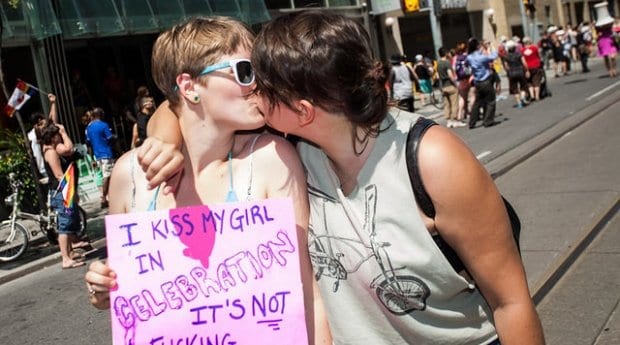As the crowds emptied out of the bars and clubs on Church Street in the early hours of June 30, Victoria Warner, on her way home after a long WorldPride weekend, was approached by a group of men who had an innocent request — could they give her a high five?
She happily complied, until the situation took a turn. “One of them pulls me in for a hug,” then reached down and groped her butt, she says.
“It was not appreciated, asked for or invited in any way,” says Warner, who was angry that the incident came after a day of enjoying WorldPride festivities.
Warner’s experience is, unfortunately, not uncommon for people who come to Pride or other large festivals. While some may blame revealing costumes, free-flowing alcohol or the general atmosphere of revelry, many activists point their fingers squarely at a pervasive culture that does not value consent.
Organizers of Toronto’s annual Dyke March, where participants are encouraged to dress however they feel the most comfortable — including nude if they so desire — say they have to actively prepare people to deal with those who may take photos or touch marchers without their consent.
“It’s really so unfortunate that this type of non-consensual interaction is almost built into the experience of Dyke March at this point,” says Laura Krahn, one of the organizers of the event.
As Pride itself has grown larger, Krahn has noticed that more people have come to view the marches as a spectacle rather than a community or political movement.
“I think some people feel that if a person is dressed up, scantily clad or painted and glittery, it’s an invitation to come and touch,” says Christin Milloy, one of the organizers of this year’s Trans* Pride March. “But Pride does not change the bounds of good etiquette. “Don’t touch someone without their permission.”
Milloy says gay men are as likely to touch without consent as straight men, but Krahn and other activists say that unwanted touching can come from anybody.
In the days following WorldPride, people took to social media to share their own stories of non-consensual touching at the festival. The volume was so great that it led Meg Fenway to write her own Facebook post emphasizing that queer does not equal consent. The organizers of SlutWalk Toronto eventually shared her post on their popular Facebook page.
Fenway says that it is heartbreaking to hear of reports of sexual assault at Pride. “It makes me sick, to be quite honest,” she adds.
Incidents of non-consensual photo taking or touching are not limited to Pride. At SlutWalk Toronto on July 12, one march marshal had to put her own body between marchers and a man who was trying to videotape the parade on a home camcorder. It’s one of the non-violent tactics march and festival organizers will use to stop people from recording images without the consent of participants.
Natalee Brouse, one of the organizers of SlutWalk Toronto, says it’s important that people view issues of consent as a broader cultural problem rather than one affiliated with just one festival. “This isn’t just a WorldPride thing — this isn’t just a Pride thing. It’s a ‘going out on the regular’ thing,” she says, adding that events like the Scotiabank Toronto Caribbean Carnival and local comic book conventions grapple with the same issues.
In response to complaints from some women dressed in role-playing costumes (known as cosplayers) that people were touching them without consent, a grassroots Cosplay Is Not Consent campaign has emerged at a number of comic conventions.
After years of dealing with oglers at the Dyke March, Krahn says, organizers there have also come up with procedures to ensure that marchers have a safe and comfortable experience while educating onlookers. A group called the Ally Squad acts as a buffer between onlookers and participants, handing out educational information about consent as they follow the Dyke March. As well, a team of active listeners is available for marchers who may need to debrief their experiences post-march.
Both Milloy and Krahn would like to see Pride Toronto take a more active role in educating people about consent. They say that after they have completed their own community consultations, they plan to present Pride organizers with suggestions for an educational campaign.
Pride organizers did not respond to Xtra’s request for comment on this story.
But education can happen anywhere, Brouse emphasizes. She recommends that people talk about consent in the clearest terms possible when the issue arises. “Bring it to the forefront,” she says.


 Why you can trust Xtra
Why you can trust Xtra


